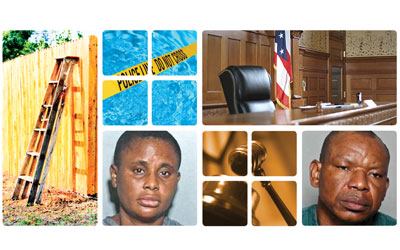A recent verdict in Florida reaffirms the notion that parental supervision around pools remains the most important layer of protection.
The case focused on a Jacksonville couple who were charged, and convicted last month, after their two children drowned in a neighbor’s aboveground pool in June 2010.
Investigators determined that 3-year-old Blessing and 6-year-old Gerrard Ibeagwa had been left home alone for more than three hours when the drownings took place.
“Obviously, your heart goes out to the whole tragedy of the situation,” said Lawrence Caniglia, executive director of the Northeast Spa & Pool Association in Hamilton, N.J. “But how telling is it that you can put up all the barriers and fences and alarms in the world, and the No. 1 reason kids drown is still lack of adult supervision? It begins and ends with keeping your eyes on the kids.”
Markanthony and Jovita Ibeagwa were charged in Florida’s Fourth Judicial Circuit Court with two counts each of aggravated manslaughter of a child. They stood trial separately, and while Jovita was found guilty as charged, Markanthony was convicted of the lesser counts of child neglect with great bodily harm.
According to Alan Mizrahi, the assistant state attorney who prosecuted the case, Jovita admitted to police she had left for work at approximately 6:35 p.m., believing her husband was on his way home to watch the children. The kids were later found by a neighbor, and a ladder had been propped against the fence surrounding the pool.
“Clearly, this wasn’t an intentional act — there was no intent to hurt their children,” Mizrahi said. “In fact, a lot of children die in pools, unfortunately, and it usually falls under negligence, where the parents are there and they just turn their backs for a few minutes.”
But to establish culpable negligence, he said, the parents’ actions had to be considered “gross and flagrant.” In this case, it was leaving the children alone for hours. During the trial, Mizrahi further questioned why Jovita never returned home even after learning, two hours later, that her husband was not there with the kids.
Jovita faces a maximum of 30 years in prison for each count while Markanthony’s charges carry up to 15 years each. Though Mizrahi hasn’t yet decided how much time he will seek, he did say long prison terms, in this instance, probably were not appropriate. Formal sentencing is scheduled for April.
Asked what lessons can be taken from the case, Mizrahi paused for a moment: “You know, it worries me to an extent that we could get into a situation where every mistake that a parent makes is prosecuted. I don’t think that should happen.
“I just hope it makes parents think twice about leaving their kids home alone,” he added. “That’s what I would hope to accomplish from this.”
For the pool and spa industry, the case of Markanthony and Jovita Ibeagwa symbolizes a noticeable shift in attitude that’s taken hold across the country in recent years, said Steven Getzoff, an attorney with Lester Schwab Katz & Dwyer, LLP, in New York, and counsel for the Association of Pool & Spa Professionals.
At one time, there was a prevailing notion that the parents and caregivers of children who died had suffered enough. However, when the death was a result of negligence, that idea appears to be dissolving. In many circles, Getzoff said, the feeling is that children are entitled to be protected from any form of criminal conduct, including neglectful parents.
It’s also a mindset, he added, that transcends discussions of building codes, entrapment prevention and other pool safety-related topics that so often consume industry stakeholders.
“I don’t care what barriers you put around pools,” Getzoff said. “There’s nothing you can do to make a pool impervious to a child who is determined to get access and who isn’t being watched. So, yes, we support sensible barrier requirements, and we always have, but none of those is a guarantee. That’s one thing we have learned.”



